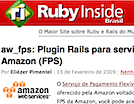 2008′s RubyFringe conference, put on by Canadian Rails consultancy Unspace, was heralded as a landmark in Ruby conferences and set a benchmark that has only recently been approached by the fervor around events like Ruby Manor. After the event, Unspace rapidly said that there wouldn’t be another RubyFringe, but…
2008′s RubyFringe conference, put on by Canadian Rails consultancy Unspace, was heralded as a landmark in Ruby conferences and set a benchmark that has only recently been approached by the fervor around events like Ruby Manor. After the event, Unspace rapidly said that there wouldn’t be another RubyFringe, but…
Unspace has decided to do it all again with FutureRuby. Like RubyFringe, FutureRuby is a single track, small (150 attendees max) conference with a focus on high energy, high quality presentations (see some videos from RubyFringe, and remember that Giles Bowkett was named our top presenter of 2008 for his RubyFringe show!) and lots of extracurricular activities (i.e. Read More



 Vidar Hokstad is the writer behind the fine
Vidar Hokstad is the writer behind the fine 
 Want to install Ruby, RubyGems, and a collection of common gems on Ubuntu 8.10 (Intrepid Ibex) in just a few minutes? Here’s the skinny.
Want to install Ruby, RubyGems, and a collection of common gems on Ubuntu 8.10 (Intrepid Ibex) in just a few minutes? Here’s the skinny. In late 2008, 399 Ruby developers took part in the 2008 Ruby GUI Survey, conducted by Alex Fenton. The
In late 2008, 399 Ruby developers took part in the 2008 Ruby GUI Survey, conducted by Alex Fenton. The 

 Can you remember what a hideous chore it was to deploy Ruby-based apps (Rails apps being a key example) before early 2008? FastCGI, proxying schemes, plain old CGI – it was all a bit of a mess. It was so bad, in fact, that in January 2008 we posted
Can you remember what a hideous chore it was to deploy Ruby-based apps (Rails apps being a key example) before early 2008? FastCGI, proxying schemes, plain old CGI – it was all a bit of a mess. It was so bad, in fact, that in January 2008 we posted  If you read a lot of Ruby blogs, you might see people talking about testing (or its behavior driven equivalent) as if it’s the holy grail, yet most Ruby books and online tutorials fail to cover it in much detail at all. Last year, Jamie Van Dyke wrote an article for
If you read a lot of Ruby blogs, you might see people talking about testing (or its behavior driven equivalent) as if it’s the holy grail, yet most Ruby books and online tutorials fail to cover it in much detail at all. Last year, Jamie Van Dyke wrote an article for 

